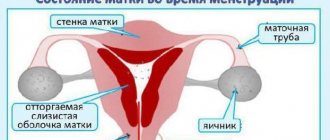Thrush during menstruation is not that uncommon. Candida fungi are the main “culprits” for the development of the disease; they are part of the normal microflora of the genital organs of approximately 10% of the female population of the planet.
Single fungi are found in every representative of the fair sex. Under favorable conditions, they begin to actively multiply - causing vulvovaginal candidiasis.
Reasons for the development of thrush before menstruation
Candidiasis is a fungal disease accompanied by a number of characteristic symptoms. Normally, every woman's vaginal microflora is represented not only by beneficial, but also by pathogenic microorganisms. Their presence in small quantities does not cause harm to health.
Thrush occurs when Candida fungi actively multiply under the influence of certain factors.
These include the following:
- decreased immunity;
- disruptions in the functioning of the endocrine system;
- taking oral contraceptives;
- carrying out antibacterial therapy;
- imbalance of vaginal microflora;
- poor genital hygiene;
- visiting dirty ponds;
- hormonal disorders.
Before menstruation, the most favorable conditions are created for the growth of the fungus. As a result of this, hyphae are formed that penetrate the layers of the epithelium. In advanced cases, pathogenic bacteria can spread throughout the body, affecting internal organs. Fungal infections multiply most quickly in high humidity, in an acidic environment and at low temperatures. Therefore, hypothermia can also provoke thrush.
Disturbance of the microflora can be caused by non-compliance with the principles of intimate hygiene, an incorrectly selected cleanser or wearing low-quality underwear. In some cases, the microflora changes due to improper nutrition. Candidiasis can occur with excessive consumption of sweet and starchy foods. In addition, infection with the fungus is possible through intimate intimacy.
After treatment with antibiotics, the body's immune defense is significantly reduced. On this soil, the number of fungi in the microflora exceeds the volume of lactobacilli. Therefore, thrush often occurs after surgical procedures. This can also happen while taking birth control pills. They provoke hormonal imbalance in the body.
The importance of diagnosis and consultation with a doctor
Menstrual bleeding complicates diagnosis, so it is almost impossible to determine the presence of thrush yourself. Diagnosis by a gynecologist will include several stages:
- taking anamnesis - symptoms, general health, presence of past episodes of candidiasis;
- examination of the genitals in a gynecological chair for redness, swelling and specific discharge;
- taking a smear from the vagina for a microscopic examination of the vaginal microflora.
Test results are a key factor in making a diagnosis. They can refute the presence of candida, confirm or detect a mixed type infection.
You can also do the analysis using a pharmacy rapid test to determine thrush. However, due to the presence of blood in the smear, the result of such testing may be incorrect.
What can happen if you try to identify and treat thrush on your own? It depends on luck and home therapy techniques.
Symptoms of thrush during menstruation
The main characteristic signs of candidiasis include curdled discharge, itching and redness of the vaginal mucosa . During critical days, symptoms may intensify. After urination there is a strong burning sensation . Along with menstrual blood, mucus with an unpleasant odor . It is impossible to use sanitary pads in this case due to pronounced discomfort. The situation is complicated by the fact that not all antifungal agents are allowed to be used during menstruation.
Relationship between delay and candidiasis
The smooth functioning of a woman’s reproductive system and cyclical changes in hormonal levels can fail. This disrupts the frequency of monthly bleeding. The simultaneous appearance of thrush encourages women to think about the relationship between these processes. In fact, candidiasis is not the cause of delay, nor is the absence of menstruation due to a fungal disease. These conditions may have a single cause, such as pregnancy. Often, in the early stages, the vaginal microflora changes, which provokes the growth of yeast-like microorganisms. At the same time, the patient discovers a delay in menstruation associated with the new position.
Another reason that can cause simultaneous absence of menstruation and thrush is menopause. This process also has a hormonal origin. Candidiasis occurs due to long-term use of antibiotics, and the disease they treat can cause menstrual irregularities.
Features of the treatment of thrush during menstruation
To eliminate candidiasis, medications are used for internal and local use. During menstruation, most vaginal creams and suppositories are prohibited. If there are no contraindications, the doctor prescribes Pimafucin or Flucostat . After the end of your period, you should take a test to detect the presence of fungi in the microflora. If necessary, additional medications are prescribed in the form of suppositories: Clotrimazole, Terzhinan, Livarol or Nystatin . Suppositories are inserted into the vagina once a day before bedtime. The total duration of antifungal therapy is 5-7 days.
It should be remembered that addiction to certain drugs develops over time. If the treatment was ineffective, it is necessary to select an alternative agent with an antifungal effect. Traditional medicine methods can only cope with symptoms, so you should refrain from using them.
After therapy, it is necessary to restore the vaginal microflora. Vaginorm-C suppositories are considered the most common and effective drug . Once inside, the active components of the drug stimulate the growth of lactobacilli. Alternative replacements for Vaginorm-C include Lactobacterin and Bifidumbacterin . The average course of microflora restoration is 10 days.
Traditional healing
Another extreme is to abandon antifungal medications and replace them with traditional medicine recipes.
Traditional methods often relieve unpleasant symptoms that begin during menstruation. However, this does not guarantee a correct and long-term therapeutic effect.
The therapeutic effect of home remedies is based on the bactericidal, antiseptic and anti-inflammatory properties of the components. However, treatment with artisanal methods will not provide an antifungal effect, which is the basis of the fight against fungus.
Also, most homemade antiseptics destroy the natural microflora of the vagina, killing not only fungi, but also beneficial bacteria. Against the background of such treatment, vaginal dysbiosis develops, which promises the development of bacterial vaginosis, vaginitis or recurrent thrush.
If you have thrush, you should not take baths, wash your face, apply applications, or douche without a doctor’s prescription.
You should be especially careful with the douching procedure. It is absolutely impossible to carry it out during menstruation without a doctor, since there is a risk of blood getting back into the uterus.
Such methods of introducing and applying medicinal solutions are almost never used in official medicine for systemic use, since they can harm the natural microflora of the vagina.
If you prefer alternative treatments, you should discuss this with your doctor. First of all, even for traditional treatment, you need to know the correct diagnosis. Also, the gynecologist will be able to warn about unsuccessful methods of treating thrush and their consequences.
Finally, not all herbal remedies are contraindicated for thrush. Doctors suggest combining the regenerating and anti-inflammatory properties of some herbs with basic antifungal therapy to speed up the healing and restoration of the mucous membrane.
What to do if thrush appears before every period
When symptoms of candidiasis constantly occur before the onset of menstruation, it is necessary to undergo a detailed examination of the body. The chronic form of the disease is often accompanied by other pathological processes. It is extremely important to find the reason for the weakening of the body during critical days. To reduce the severity of symptoms, the following principles must be considered:
- It is required to follow the rules of intimate hygiene. During menstruation, it is advisable to carry out water procedures at least three times a day.
- Strengthening your immune system will help you avoid developing candidiasis in the future. To this end, you should enrich your diet with minerals and vitamins, take daily walks in the fresh air and play sports.
- Treatment for thrush should always be carried out by both sexual partners. For men, medications are provided in the form of ointments. Women most often use vaginal suppositories. Intimacy during therapy is contraindicated.
- It is strictly forbidden to do douching and baths during menstrual periods. This can lead to infection in the genital tract.
- To avoid thrush, you need to eat right. The diet should include fruits, herbs and vegetables. It is advisable to avoid eating junk food. Fermented milk products have a positive effect on the vaginal environment.
- Underwear should be of high quality and comfortable. It is important that it is made of natural, breathable fabric. Cotton would be a good option.
- Regular visits to the gynecologist will help to timely diagnose diseases that can cause the development of candidiasis. You should visit a female doctor at least twice a year.
Consequences
If you regularly worry about thrush during menstruation, your doctor will tell you what treatment will help after the examination. Independent choice of medications and folk remedies may turn out to be incorrect. As a result of such treatment, the disease will worsen. You should not start therapy on your own if signs of thrush begin to bother you a few days before the expected bleeding. Perhaps malaise is the first sign of pregnancy, and the use of any medications in the early stages can lead to unpleasant consequences.
If periodic anxiety does not make a woman want to be examined and treated, then you should find out that prolonged candidiasis is accompanied by complications:
- inflammation (fungi suppress lactobacilli, which leads to the growth of pathogenic flora, as a result of which microorganisms penetrate the uterus);
- adhesive process (inflammation of the genital organs causes the formation of fluid in the pelvic cavity, which leads to an adhesive process);
- abdominal pain (occurs due to inflammation and the formation of adhesions between the pelvic organs);
- decreased immune defense (appears due to an imbalance of beneficial and harmful microorganisms);
- infertility (caused by adhesions in the fallopian tubes and disruption of the ovaries);
- candidal sepsis (the pathogen moves to other organs over time, causing blood poisoning).
To prevent complications and regular exacerbations of vaginal fungal diseases, it is necessary to strengthen the immune system and maintain personal hygiene. Also, the development of pathology is influenced by lifestyle and nutrition. You should exercise and eat healthy foods. If the symptoms of thrush bother you every time during menstruation, and disappear without a trace when they end, you need to look for another cause of poor health.
Approximate prices for drugs in pharmacies
| Name of medicine | Approximate prices |
| Fluconazole | from 20 to 200 rub. |
| Flucostat | from 150 to 350 rub. |
| Mikomax | from 180 to 400 rub. |
| Pimafucin | Tablets from 400 rub. Cream from 250 rub. Candles from 200 rub. |
| Nystatin | from 20 rub. |
| Ecofucin | from 200 to 300 rub. |
| Miconazole | Cream 90-120 rub. candles 200-360 rub. |
| Diflucan | from 400 to 900 rub. |
| Ketoconazole | Tablets from 200 to 500 rubles. Candles 30-100 rub. |
| Ginofort | from 500 rub. |
| Clotrimazole | from 30 to 150 rub. |
| Zalain | from 500 rub. |
| Levarol | from 250 to 400 rub. |
| Hexicon | from 200 rub. |
Tags: time, menstruation, thrush About the author: Admin4ik
« Previous post










